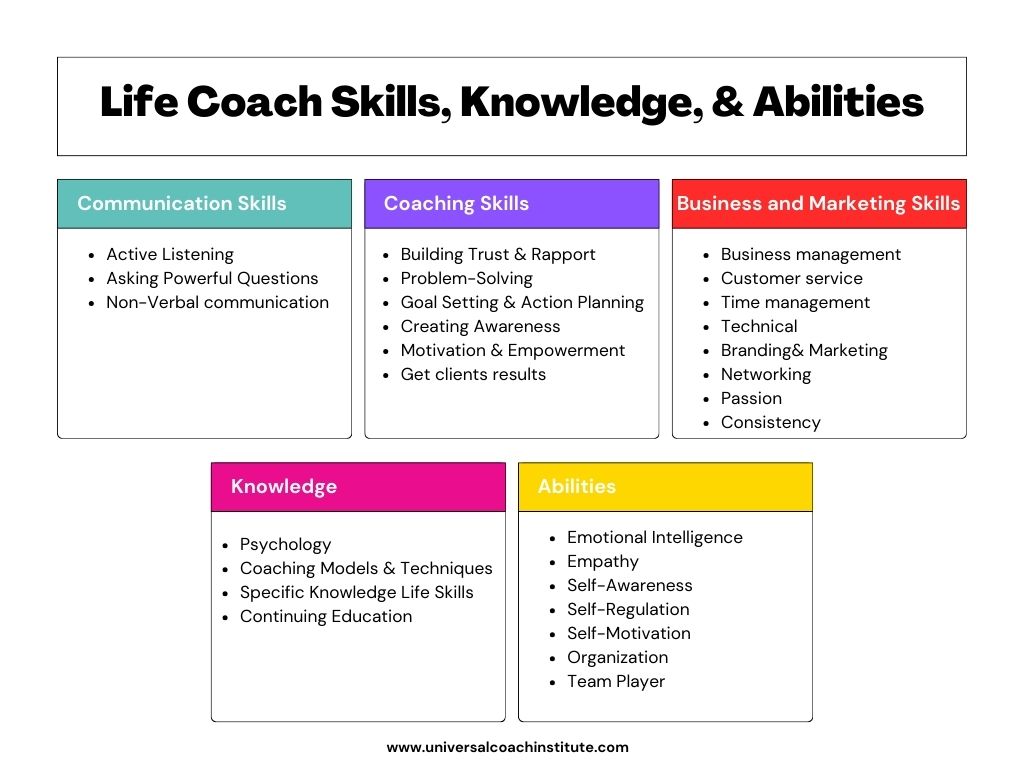When most people think of the role of a life coach, they often envision someone who offers advice and solutions to life problems.
However, the truth is quite the opposite. A life coach is not an expert in the client’s life. The client is the true expert in their own life.
So, you may be wondering, what exactly is the role of a life coach then?
Well, let me tell you: a life coach acts as a guide from behind. They understand that the client already holds the answers within themselves.
It takes coaching skills to help bring forth those answers and unleash the client’s full potential.
In this post, I will delve into the essential skills that make a life coach successful.
Get ready to discover the art of life coaching!
Essential Life Coach Skills
A life coach is like a guiding light that helps clients get from where they are to where they want to be.
Here are the essential skills a life coach uses to achieve this:
Communication Skills
Effective communication is the foundation of successful life coaching. It includes clear expression, attentive listening, and understanding of the client’s perspectives. As we delve into this skill, you’ll discover its profound influence on the coaching relationship.
Active Listening
Active listening goes beyond hearing words. It’s about tuning in to what the client is saying and not saying. It’s about truly understanding their perspective. It’s about reflecting back to them what you heard to help the client gain self-awareness. It’s a judgment-free and supportive listening approach.
Active listening is demonstrated through a technique called mirroring.
Mirroring consists of:
- summarizing
- paraphrasing
- reiterating
- reflecting on feelings
- clarifying
Asking Powerful Questions
Questions separate life coaches from therapists, advisors, mentors, and others. Next to active listening, questions are THE coaching tool. Remember earlier when I said the clients have the answers inside them? Well, in coaching, we use questions to bring the answers out. We ask purposeful and powerful questions.
A powerful question stimulates thought. It motivates a client to take action through its answer.
Powerful Question example:
- What are you doing now to shape your life of tomorrow?
- What can you stop doing to make room for change?
- What are you holding on to that no longer serves you?
Non-verbal communication
Non-verbal communication involves listening to what a client is not saying. It’s in the subtle body language, the telling facial expressions, the expressive gestures, and the tone of voice. A coach’s understanding of these subtleties can provide insights into a client’s feelings. It unveils a hidden world of thoughts, revealing more about their state of mind than words ever could. It’s amazing how much more we can learn about someone’s state of mind beyond their words!
That’s a wrap on communication skills! But remember, there’s still much more to learn about communicating as a life coach.
Those were just the essentials.
Now, let’s focus on the specific coaching skills required for a life coach.
Coaching Skills
Life coaching skills are the tools and techniques a coach utilizes to coach clients. They are the foundations of effective coaching and facilitating changes in clients’ lives.
Building Trust and Rapport
Building rapport isn’t just about creating a comfortable environment. It’s a vital piece in coaching. The reason is simple: Trust. Trust is the foundation of any successful relationship. Clients who trust their coach open up, share more freely, and engage in the process. This increased openness accelerates their progress and deepens the impact of coaching.
Problem-solving skills
Problem-solving skills enable a coach to guide clients through their challenges. In coaching, problem-solving skills aren’t about providing ready-made solutions. It’s about empowering clients to create their own solutions. Life coaches use these skills to help clients identify barriers and brainstorm strategies. Doing so fosters clients’ self-confidence and resilience. It also strengthens their ability to tackle future challenges.
Goal Setting and Action Planning
Goal setting and action planning are key skills for helping clients in their transformation journey. A skilled life coach assists in defining clear, achievable goals. They help in creating detailed, step-by-step action plans. This provides clients with a solid direction for personal growth and development. It stimulates motivation and acts as a north star for navigating life’s challenges. By breaking down overwhelming goals into manageable tasks, coaches reduce client anxiety and increase self-efficacy. Action plans also serve as a framework for monitoring and assessing progress. They increase the likelihood of success.
Creating Awareness
A life coach proficient in creating awareness can guide clients to introspect. They can help clients understand their actions, emotions, and motivations better. Self-understanding is the first step towards change. It allows clients to identify patterns that may be detrimental to their growth. Creating awareness equips them with the means to optimize their life trajectory.
Motivation and Empowerment Skills
Motivation and empowerment allow a life coach to inspire and push clients toward realizing their goals and potential. A life coach uses these skills to build a client’s self-confidence and foster a belief in their capabilities. A life coach can assist clients in pursuing their goals and achieving personal fulfillment by combining motivation and empowerment.
Get clients results
The ability to deliver results is crucial for a life coach. It showcases the coach’s proficiency in integrating key coaching skills. These include listening, questioning, creating awareness, motivating, and planning. It reflects the coach’s capacity to guide clients through a transformational journey towards tangible outcomes. Also, it underscores their ability to empower clients, overcome challenges, and achieve goals. A coach with this skill inspires change and creates a lasting impact. This enhances credibility and confidence in the coaching process.
Next, let’s dive into another essential yet often-overlooked area of a life coach’s success…
Business and Marketing skills
Business and Marketing Skills
Many people who become life coaches choose to start a business instead of seeking traditional employment.
To succeed, you must understand how to market your services, attract clients, and manage your coaching practice. This requires blending business acumen with marketing savvy.
Below are key business skills needed for success in the field of life coaching.
- Business management
- Customer service
- Time management and organization
- Technical
- Branding and marketing
- Networking
- Passion
- Consistency
If you’re feeling a bit short on business and marketing skills, don’t worry! There are plenty of avenues to acquire them. You could seek the guidance of a business coach or undergo life coach training. A comprehensive coach training school will offer training on how to start a business.
Knowledge
Knowledge is the cornerstone of a successful life coaching practice. It involves understanding a wide range of topics, from the psychology of change to various coaching methods. Knowledge is crucial to guiding clients through their transformative journey.
Let’s take a look.
Psychology
Life coaches don’t require a formal degree. However, they must understand the interplay between the human mind, behavior, and motivation. To be well-rounded, they should explore other aspects of psychology, such as:
- positive psychology
- neuroscience
- and the art of habit formation.
By doing so, they can unlock the full potential of their clients and empower them to thrive.
Coaching Models & Techniques
Diversity in coaching models is important for life coaches. Individuals respond to different strategies based on their unique traits, circumstances, and goals. Having a toolkit of models allows coaches to tailor their approach to a wide range of clients and situations. It also promotes continuous learning and professional development.
Some notable models and techniques include:
- Appreciative Inquiry
- Solution-Focused Coaching
- Motivational Interviewing
- Cognitive Behavioral Coaching
Specific Knowledge Life Skills
When a coach chooses to specialize in a particular niche, they must possess specific knowledge and skills in that field. Coaches can cater to their client’s needs by refining their expertise and gaining a deeper understanding. This enables them to offer guidance that is tailored to the individual. Having specific knowledge of life skills fosters a meaningful and impactful coaching experience.
Continuing Education
The field of human development is constantly evolving with new research, theories, and practices. Life coaches can ensure they have the most effective strategies to help their clients by committing to lifelong learning. Continual learning fosters credibility. It demonstrates to clients that the coach is dedicated to their profession. This commitment elevates the standard of coaching and leads to successful client outcomes.
Now, let’s delve into the specific abilities that can elevate coaching sessions.
Abilities
Abilities encompass the inherent or acquired skills a coach uses to navigate coaching sessions.
Below are some essential abilities a life coach should have.
Emotional Intelligence
Life coaches handle diverse client issues. This requires awareness and skill in expressing and managing emotions. Emotional intelligence plays a pivotal role in fostering fair and empathetic coaching relationships. It includes recognizing one’s own emotional state and the emotional states of others. It involves identifying, utilizing, comprehending, and managing emotions.
Empathy
Empathy allows a coach to understand and connect with clients’ emotions and experiences. This understanding results in a more personalized coaching approach. An empathetic coach can help clients feel acknowledged, fostering a trusting relationship.
Self-Awareness
When a life coach is self-aware, they can understand their own strengths, weaknesses, biases, and emotions. It allows them to coach their clients without imposing their own beliefs. This ensures the focus stays on the client’s unique journey. A self-aware coach can recognize when their limitations might hinder a client’s progress. For example, they can refer the client to another professional if needed. In essence, self-awareness is key to maintaining the integrity of the coaching process.
Self-Regulation
Merely being self-aware is not enough for success. Life coaches must be able to regulate their thoughts, emotions, aspirations, and motivations. Self-regulation involves maintaining composure in emotional or stressful coaching sessions. By exhibiting self-regulation, a life coach can demonstrate emotional maturity.
Self-Motivation
Motivational skills play a crucial role in the toolkit of life coaches. However, it’s equally important for life coaches to cultivate self-motivation within themselves. A self-motivated life coach has an internal drive that keeps them going despite adversities. They understand that life and business can present challenges. Still, they remain steadfast in their commitment to push through. This unwavering dedication can create a ripple effect. It can inspire their clients to embrace their own potential and strive for greatness.
Organization
Being organized allows coaches to manage their time and properly schedule sessions. This is essential in ensuring clients receive the attention they need to reach their goals. Being organized also entails documenting and keeping track of each client’s progress. This aids in providing comprehensive and consistent support to clients over time.
Team Player
Being a team player involves collaboration, respect, and understanding in the coaching relationship. Coaches and clients must work together to achieve the client’s objectives. Life coaches recognize that the client is the expert in their own life. A coach supports and facilitates rather than leads or dictates. This collaboration encourages clients to take ownership of their growth and development. In essence, being a team player as a life coach means working harmoniously with clients to enable their success.
Take-Home Message
A life coach amalgamates many qualities and skills. Becoming a successful life coach is neither linear nor a destination. It’s a continuing process of learning, self-reflection, and improvement. It takes dedication, passion, and a sincere desire to make a difference in the lives of others. One can hone their life coaching skills through proper training and practice. Remember, every step you take on this path is a testament to your commitment. It shows your dedication to helping others achieve their goals. You are not just building a successful career for yourself. You are also fostering a positive change in others’ lives.




